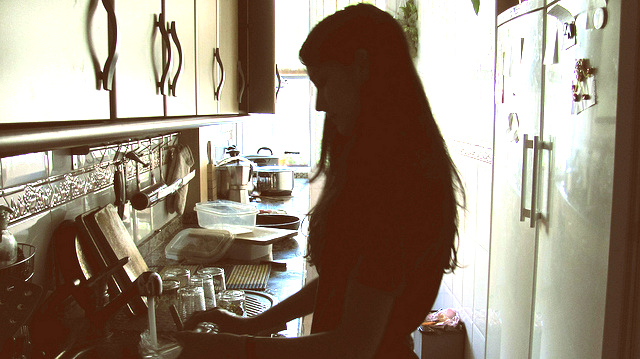When I met my husband several years ago, we both were in a position, professionally and personally, to make traveling and seeing the world our priority.
In fact, together we were an unstoppable nomadic force; working remotely while exploring other cultures and landscapes quickly became our way of life. From the rainforest of Costa Rica to the rice fields of Bali, we were living our dream.
Until we weren’t.
En route from Guatemala to Thailand, I became very ill. Nauseous and with an extremely distended stomach, I had little strength and was in a fog. It took nearly six months of being in bed—a mere shadow of myself—and more specialists than I can count before I was able to get a proper diagnosis: I had contracted a parasite called Entamoeba histolytica.
There is an Indian proverb that says, “A man with his health has 1,000 dreams; a man without it has only one,” and let me tell you, I have never experienced anything more true.
For me, it was a dark and lonely time. I sought answers with every ounce of energy I could muster and I honestly didn’t know if I would be sequestered to the sidelines of life for the rest of my life.
This experience changed me in many ways. Along with knowledge, I gained empathy, compassion and understanding. And when I got my health back, I also got 1,000 dreams to help others do the same. I traded my desperation and my fears for a sense of purpose. Life sure has a funny way of working out exactly as it should, of turning lemons into the best damn lemonade we’ve ever tasted.
I became empowered with the knowledge of the role of the microbiome in regard to our overall health and wellbeing. A shift occurred as I began to understand the importance of gut health and that everything—from our diets high in processed foods to chlorine in our water, antibiotics in our livestock, and even not being breastfed as a child—can leave us severely deficient in one of the most important aspects of immunity: probiotics.
Armed with research and invigorated with possibilities, I wanted to empower others just like myself, on their journey toward greater health. The concept that bacteria is both the foundation and the future of health ignited my quest to make a difference by imploring the greatest minds in science and medicine to develop superior probiotic formulas.
Along with founding a probiotic line, I strive to be a listening ear, source of inspiration and wealth of knowledge for my community when it comes to health—which I believe originates in the gut.
Here are eight easy steps to ensure you are living in harmony with your microbes, in order to be your healthiest, most vibrant self:
1. Steer Clear of Toxins and Antimicrobials.
Antimicrobials and toxins that can deplete your beneficial bacteria are everywhere. Probiotic-destroying elements are in the air, in the ground (pesticides), in our homes (cleaning supplies, personal care products, and paraffin candles), and in our food and water (chlorine, fluoride, and more). Choose organic whole foods, filtered water and natural cleaning supplies that rely on the power of plants, not harsh chemicals and toxins.
2. Do Your Best to Avoid Unnecessary Antibiotics and Medications.
Many types of medications—such as antacids, birth control, hormone replacers, steroids and NSAIDs—can be harmful to your good gut flora. Antibiotics, both in the food supply and as medicine, also tend to indiscriminately wipe out your good bacteria along with the bad. It’s best to only take them if absolutely necessary. And if you do, consider taking a probiotic in conjunction.
3. Eat Well.
What you eat can have a tremendous effect on the composition of your microbiome, often within just a few hours of a meal. A diet high in plant-based fiber and whole foods will do wonders for your gut flora. Make sure to avoid processed, sugary foods and anything containing emulsifiers, pesticides, artificial sweeteners or GMOs, which all can deplete good bacteria. Fasting as long as possible between dinner and breakfast the next day also does wonders for your gut flora (1).
4. Hand Wash Dishes.
Dishwashers are convenient, but they may be harming your gut. Researchers studied over 1,000 children and discovered that kids whose families hand-washed dishes (as opposed to using a dishwasher) had significantly lower rates of immune system issues (2). Washing dishes the old fashioned way exposes us to more microbes and when it comes to immune system development, the more bugs, the better.
5. Eat Plenty of Prebiotics.
We need to eat and so do our microbes, so why not do some double duty? Prebiotics are indigestible fibers that nourish and feed all the healthy bacteria in your gut. Sources of prebiotics include asparagus, bananas, onions, garlic, jicama and dandelion greens. Our modern diets are often severely lacking in the rich, whole-food fibers so go overboard with prebiotics and your gut bugs will thank you.
6. Take it Easy.
Yes, even stress can wreak havoc on the good microbes in your body. Stress makes your gut more accessible to unwanted bacteria, antigens and toxins. Once the unwanted bacteria get in, they trigger an immune response that in turn depletes your microbiome. Practicing daily meditation, yoga and other mindfulness techniques can help keep stress at bay.
7. Stay Active & Get Outdoors.
Having plenty of exposure to nature, organic soil, and animals in the home (or on a farm) gives you the opportunity to interact with a wonderful plethora of bacteria that will ultimately strengthen your system. Research shows that people who are active have healthier microbiomes than non-active folks. In one groundbreaking study, active rugby players had much more diverse gut microbiota than sedentary subjects (3). Go camping, try gardening or play with your dog in the yard for a good dose of microbes (and stress relief).
8. Take a Probiotic.
Even if we had a perfect microbial start in life (natural birth and breastfed exclusively for at least six months), live relatively stress-free, eat all organic, and exercise regularly, our modern lifestyles inevitably lead to some depletion of our good bacteria. Fortunately, you can replenish what you may have lost (or never had to begin with) by taking a daily high-quality probiotic formula.
References:
1. Erdogdu, C. (2016, June). Increased Akkermansia muciniphila and Bacteroides fragilis Group Abundance After Islamic Fasting. Poster session presented at the meeting of the American Society for Microbiology, Boston, MA.
2. Hesselmar, B., Hicke-Roberts, A., & Wennergren, G. (2015). Allergy in Children in Hand Versus Machine Dishwashing. Pediatrics, 135(3).
3. Clarke, S. F., Murphy, E. F., O’sullivan, O., Lucey, A. J., Humphreys, M., Hogan, A., . . . Cotter, P. D. (2014). Exercise and associated dietary extremes impact on gut microbial diversity. Gut, 63(12), 1913-1920.
~
Author: Jamie Morea
Image: flickr/Eleazar
Editors: Ashleigh Hitchcock; Emily Bartran












Read 0 comments and reply